You are probably looking to have a guinea pig as a pet because you find them cute and because they are harmless! As an owner of guinea pig, you want to know more about them. The reasons may be different but all you want to know are some amazing guinea pig facts.
The very amazing fact about the guinea pig is that it is not a pig and is not remotely related to pigs. In fact, it is a rodent so you can relate it to a rat. Also, their origin is not Guinea, it is actually the Andes of South America.
50 Amazing Guinea Pig Facts You Need to Know
Fact #1: Guinea Pigs Are Not That Friendly
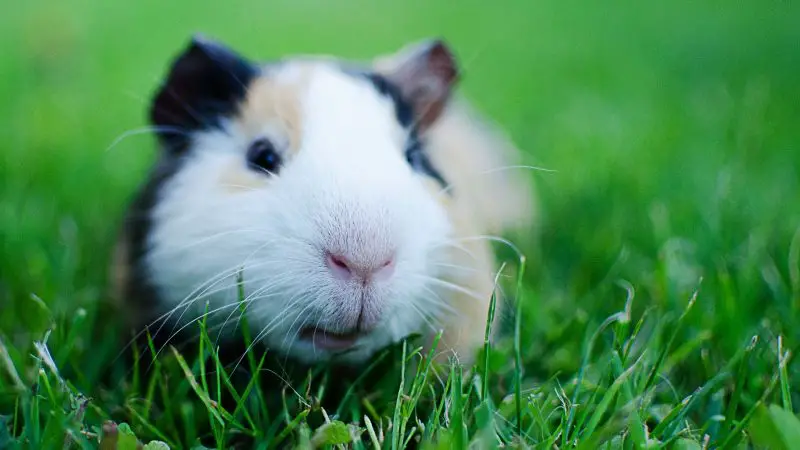
Guinea pigs are not friendly with other species. Actually, it is more of another way around. If you put other rodents with them, they will most probably get infections or respiratory problems. Also, guinea pigs are so small that other rodents may consider them as prey and eat them. We definitely don’t want that kind of violence in our house. Otherwise, they are quite social among the same species.
Fact #2: They Are Intelligent
Guinea pigs can remember even the difficult passages to food and can remember it for months while we can’t even recall where we left our keys.
Fact #3: They Need Vitamin C
Guinea pigs’ body does not make Vitamin C and thus they need to intake it from their food. So, it is important to feed them Vitamin C if you are planning to have one as a pet. Buy some Vitamin C supplements for better care. It is an interesting fact because even the human body doesn’t produce Vitamin C.
Fact #4: Their Teeth Are Always Growing
Like our hair, their teeth are always growing. They will need something to chew to keep them from getting too big. They have 20 teeth.
Fact #5: People Eat Guinea Pigs
Guinea pigs are a culinary staple in the Andes Mountain, South America, where they are known as cuy.
Fact #6: The Story Behind the Name

While guinea pigs are not from Guinea, it is possible that “guinea” was incorporated into their name since they may have been sold for a guinea (a kind of English coin). Some people also say that Europeans may have believed that guinea pigs came from the African country, Guinea since ships conveying the furry mammals from South America frequently used to halt there before going ahead towards Europe.
Fact #7: Consent Is Everything Even Among Guinea Pigs
If the female is not interested in a male during courtship, she will squirt urine at the tenacious male.
Fact #8: Science Has Another Name for Them
Cavia porcellus is the scientific name given to these cute creatures, which means ‘little pig’.
Fact #9: Lab Experiments
Guinea pigs have been used for biological experiments in laboratories since the 17th century. They are still used as subjects in medical sciences for diseases like diabetes, tuberculosis, scurvy, and pregnancy complications.
Fact #10: Size
Guinea pigs are tailless and weigh about 1.5 lbs. to 2.5 lbs. They are light because their bones are also brittle.
Fact #11: They Are Most Active During Twilight
While we hate waking up early in the morning and being exhausted till evening, guinea pigs, on the other hand, are most active during dusk and dawn. Therefore, they are called crepuscular animals. These animals are most active during dusk and dawn, i.e. twilight.
Fact #12: They Love Eating Plants
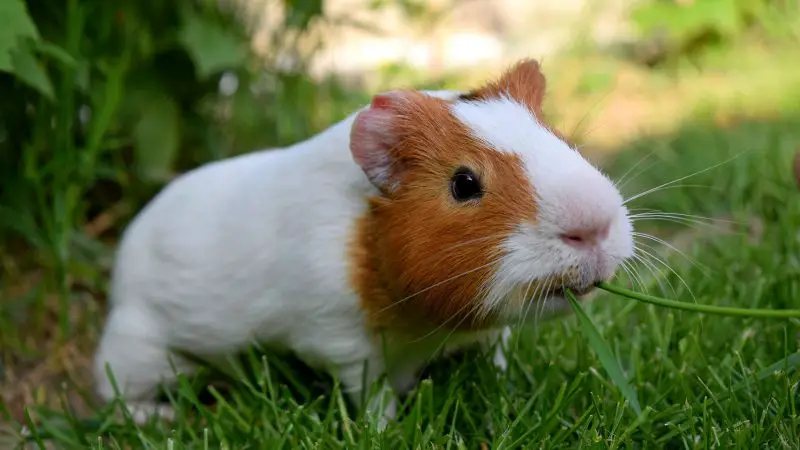
Guinea pigs are herbivores and rely on plant-based sources for nutrition. Since most guinea pigs are domesticated, you can feed them alfalfa hay, vitamins, and other minerals to keep them healthy.
Fact #13: They Are Vocal yet Silent Creatures
Some guinea pigs can produce sounds as loud as ultrasonic i.e. more than 20,000 Hz.
Fact #14: They Live Long
Guinea pigs might not live as long as your other pets, like dogs or cats, but they live long enough. Generally, they live for about 4 or 5 years and may live up to 8 years too. The longest-living guinea pig lived for about 14 years and 10 months.
Fact #15: They Eat Poop
Guinea pigs eat their own poop directly from below and that is completely normal in some animals. This is called coprophagy. No, wonder they are called pigs!
Fact #16: They Are Born Talented
They are precocial animals, which means that they are born in an advanced state and can feed themselves almost immediately. They have hair, fully opened eyes, and well-developed teeth. Within a few hours, they are ready for this world.
Fact #17: 258 Bones in a Small Body
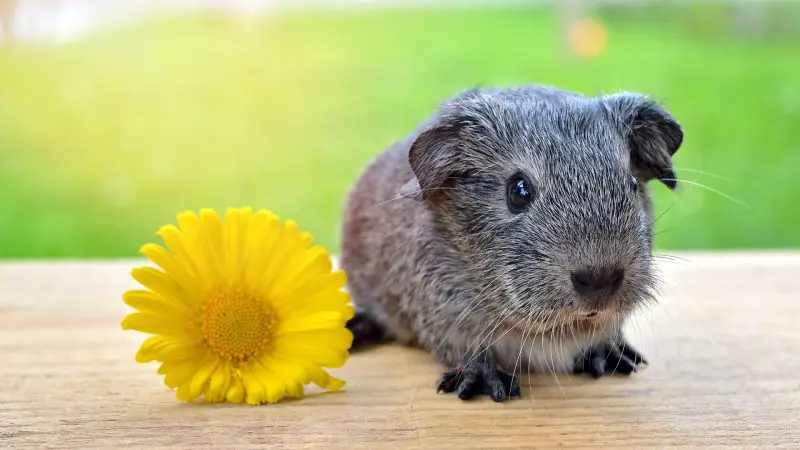
Who would think that these tiny little creatures have 258 bones in their bodies? The bones are brittle so it would be wise to not treat them like your other pets.
Fact #18: They Can Rotate Their Eyes
Guinea pigs do not have very good eyesight. However, they can rotate their eyeball to 360 degrees, which means they can see someone standing behind them without moving their neck.
Related: Can Guinea Pigs See Color? | All You Need to Know!
Fact #19: They Will Show When They Are Happy
Guinea pigs purr like a cat when they are happy or maybe it is their way to tell you that they love you too.
Fact #20: They Have Weird Feet
Guinea pigs have four toes in the front limbs and three in the hind limbs.
Fact #21: They Easily Get Shocked
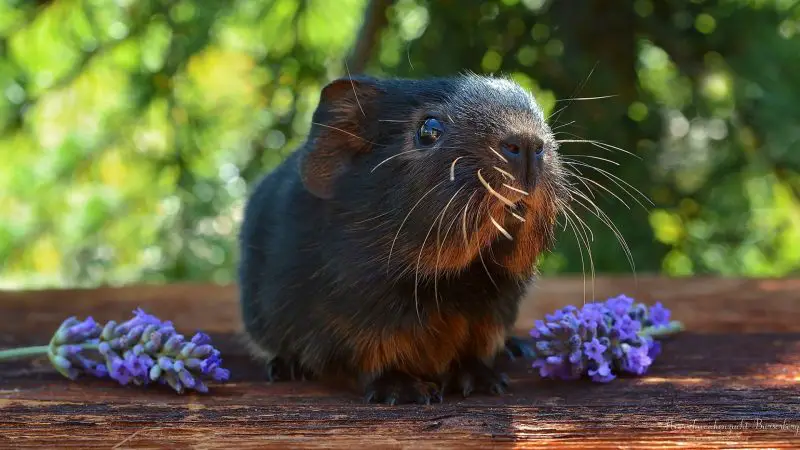
Guinea pigs remain startled for long periods when they think they have been attacked or start moving haphazardly when in groups to confuse the enemy.
Fact #22: Weird Doctor Techniques
Doctors in some areas of South America put guinea pig on top of the patient’s body parts. When guinea pig makes some noise, it is considered as damaged.
Fact #23: They Believe in Grooming
Guinea pigs do not need hairstylists because their eyes secrete a milky white substance, which they rub on themselves to keep their hair tidy and well-groomed.
Fact #24: They Don’t Sleep Much
Guinea pigs don’t sleep for long hours. Instead, they take short naps and never sleep for the long run.
Fact #25: Very Nervous Animal
Guinea pigs get easily nervous when they don’t like someone. So, it is better to leave them alone if they don’t like you because you don’t want to stress them.
Fact #26: Name of Their Family
Male guinea pigs are known as boars. Female guinea pigs are known as sows and pup is used for the young ones.
Fact #27: If Females Don’t Give Birth, They Die
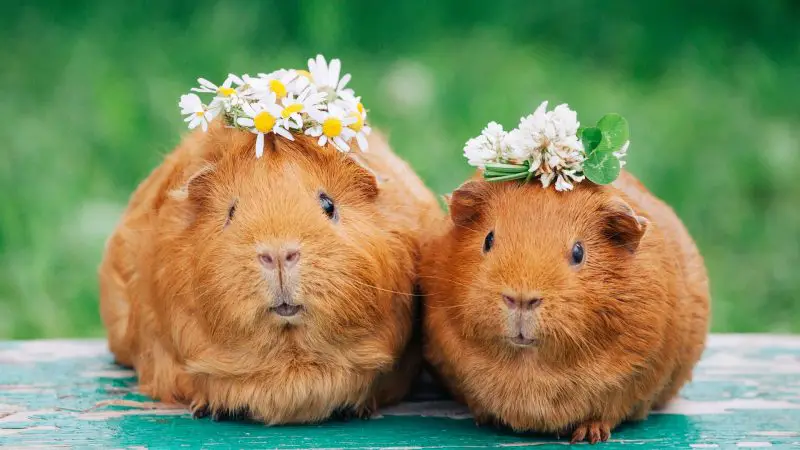
If female guinea pigs do not give birth to a young one before 6 months, she can die because her pubic bone fuses if she doesn’t give birth to young ones. She can’t even give birth even if she wants to. So, if she gets pregnant after pubic bones are fused, she will die.
Fact #28: The Story of Their Fame
Guinea pigs became popular when Queen Elizabeth made a guinea pig her pet. That’s how they became famous as peoples’ favorite rodent pets.
Fact #29: Another Story of Glory
Truffles, a guinea pig from the United Kingdom, was mentioned in a Guinness World Record for the longest jump by any guinea pig in history. It was a 48cm jump in the year 2012. Also, a guinea pig named Puckel Martin has a record of the highest jump which was 7.8cm.
Related: Can Guinea Pigs Jump? | If They Can, How High?
Fact #30: The Oldest Breed
American breed is the oldest guinea pig breed and is most commonly found in pet stores. If you want to gift a pet to your small kid, this might be the best option because of their short, smooth and soft fur.
Fact #31: They Don’t like Sunlight That Much
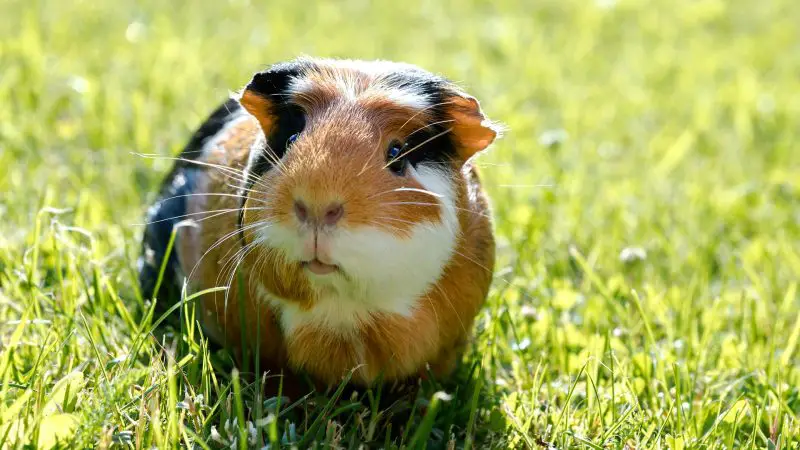
Guinea pigs have a higher body temperature than humans, about 101 degrees Fahrenheit (38.3333 degrees Celsius). So, it is better not to keep them in a hot place or in sunlight for long.
Fact #32: Animal Cruelty Should Strictly Be Banned
In Japan, an online store known as Guinea Pig Fashion sells guinea clothes, fashion accessories, hair extensions, etc.
Fact #33: Time to Get Old
They get old quite early and at the age of four years, you can call them senior citizens. All the genetic health issues also appear at this time. So, they are also good subjects to study genetic diseases.
Fact #34: Their Communication Language
Guinea pigs whistle, which shows their excitement for food or play. They also make a hissing sound or chatter their teeth to show that they are angry.
Fact #35: Reconstructive Hymen
A female guinea pig’s hymen is dynamic i.e. it appears and disappears according to their reproductive cycle. The vaginal membrane remains closed except when they in their heating period or when they are about to give birth.
Fact #36: We Have a Guinea Pig Day
July 16 every year is celebrated as Guinea Pig Appreciation Day.
Fact #37: Best Pets to Help You Relax

Guinea pigs are great companions and are a great way to teach your children values of responsibilities. Also, they are so soothing to watch for your mind.
In a recent study, it was found that guinea pigs work as a stress buster for kids suffering from autism. This could be because the kids with autism find it difficult to make friends, so it is amazing how they find a companion in a guinea pig.
Fact #38: Some Researchers Say No to Pet Guinea Pigs
Dutch researchers say that guinea pigs may carry germs, which can cause Pneumonia. In fact, three adults in the Netherlands were hospitalized due to infection from guinea pigs. That’s why it is advisable that you should take care of the hygiene conditions of your guinea pigs.
Also, do not forget to wash your hands after you have touched them. In order to protect them from any infection, take your pet to a hospital if he appears ill or shows symptoms of pink eye.
Fact #39: They Mourn for Their Partner
Guinea pigs often make a chirping sound, which is a sign that they might be sad. It happens mostly when one of the partners dies.
Fact #40: They Speak When They Are Silent Too
Like us, guinea pigs also show non-verbal communication. So, try to understand what your pet is trying to say to you.
Fact #41: Guinea Pigs Can Suffer from Depression
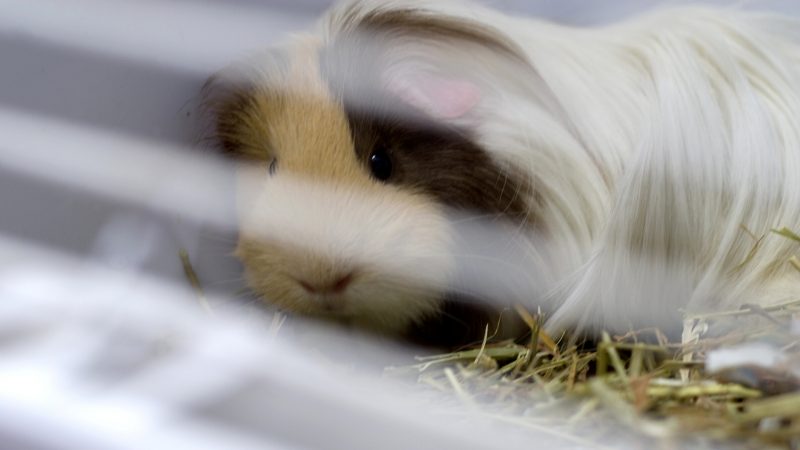
Guinea pigs are quite social and they like to be around people. Even if you don’t want to keep another guinea pig, make sure you interact with your pet.
When left alone, they get stressed and go into depression. You can tell if your guinea pig is stressed by his behavior, which shows symptoms of irritation and aggressive behavior such as fidgeting and head tossing.
On the contrary, if your pet is depressed, he will act like how a depressed human acts, less energetic! If any of these symptoms appear, you may want to call the vet.
Fact #42: They Know How to Protect Their Family
Guinea pigs always march in a single line, with a big guinea pig at the front and younger ones in the middle.
Fact #43: They Have Allergies Too
Mostly, they are allergic to all the widely available antibiotics. So, it is better not to feed and use any product on them which might contain antibiotics. Consult the veterinarian if you are not too sure about a medicine or a product.
Fact #44: It Is Better to Keep Them in an Open Environment
Guinea pigs have very brittle bones and it is not advisable to keep them bound in leashes. Also, guinea pigs need a large floor area so it is better if you get a large cage for them.
Fact #45: Largest Guinea Pig Ever
Josephoartigasia monesi used to be the ancestor of guinea pig, so it is not exactly the guinea pig we see these days. It was 5 feet high and weighed around one ton. Millions of years ago, buffalo sized guinea pigs used to roam on our earth.
Related: What Guinea Pig Breed Is the Largest?
Fact #46: The First Domestication
Domestication first started 3000 years ago by the Incas.
Fact #47: They Multiply Really Quickly
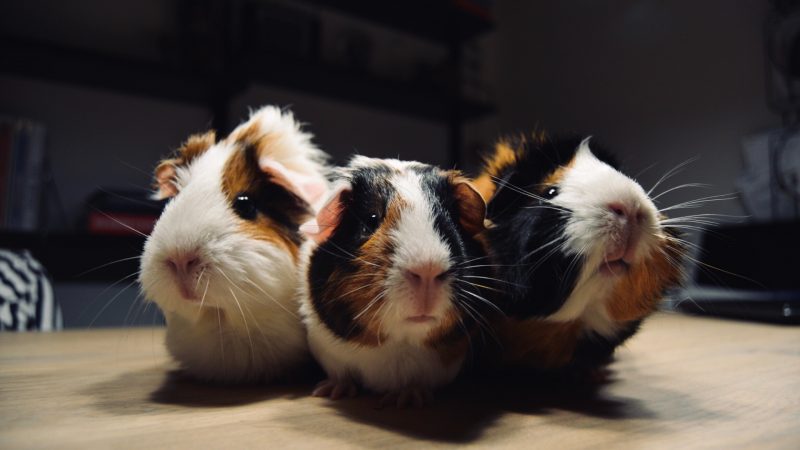
Guinea pigs are one of the easiest animals to reproduce. They would start reproducing when they are just 8 to 12 weeks old. So, if you don’t want your home to be full of guinea pigs, you better keep guinea pigs of the same sex.
Fact #48: They Do Not Sweat
Guinea pigs do not have sweat glands except in the sole of their feet. That is also the reason that they should not be put in hot places for too long. In summers, it is better to keep them in shade.
Fact #49: Avoid Confrontation
A research team from the University of Veterinary Medicine and the University of Vienna observed that female guinea pigs tend to avoid confrontation with each other during their heat period. But when they were not in their heat period, they did confront each other. This is because they see each other as competitors. So, the lesser the competition, the better the chances of getting a mate.
Fact #50: Breeds of Guinea Pigs
There are 13 breeds of guinea pigs so far. Some common breeds are American, the Abyssinian and Peruvian. Guinea pigs are of different colors and color combinations like black, cream, tan, brown and white.
List of Sources
Of Domestic and Wild Guinea Pigs: Studies in Sociophysiology, Domestication, and Social Evolution
Social Confrontation in Male Guinea Pigs: Behavior, Experience, and Complement Activity
